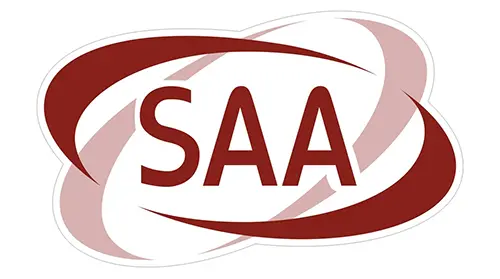
What is Australia SAA Certification?
saa stands for the Standards Association of Australia. SAA certification is carried out by regULatory authorities or third-party certification companies based on the standards of the Standards Association of Australia. This certification is often referRED to as Australian certification. Products listed on the mandatory list must pass this certification to legally enter and be sold in Australia (including both Australia and New Zealand). The SAA mark mainly has two types: form recognition and standard mark. Form recognition only involves sample responsibility, while the standard mark requires a factory inspection for every plant.

Additionally, Australia and New Zealand have implemented standard unification and mutual recognition of certifications. saa approvals Pty Ltd is a third-party certification body under the joint certification service of Australia and New Zealand (JAS-ANZ). It can issue certifications for electrical equipment that meets the applicable Australian or New Zealand safety requirements. Once a product obtains certification from one country, it can be sold in the other country.
Types and Application Methods of saa certification
SAA certification includes two types:
1. Mandatory Certification: There are about 62 categories of regulated electrical products that must obtain SAA certification, and the specified mark (certificate number) must be on the product.
2. Voluntary Certification: Although non-regulated products are not required to be certified, their safety is the responsibility of the sellers/manufacturers, and they can voluntarily apply for certification.
Application Methods for SAA Certification:
1. Use a cb certificate and report (with Australian deviations) to convert to SAA certification.
2. Use an IEC standard report and Australian deviation test to convert to SAA certification.
3. Direct application without a CB certificate or IEC standard report, which is also convenient.
Scope of SAA Certification
Mandatory Certification: There are about 62 categories such as external power supplies or chargers, electrical wires, plugs, some household appliances, etc. Regulated electrical products must obtain a recognized certificate issued by regulatory authorities, known as SAA certification, and must bear the specified mark (certificate number).
Examples of mandatory certified products:
1. Electrical connectors
2. Arc welding machines
3. Bayonet lamp holders
4. Bayonet lamp holder adapters
5. Carpets
6. Toasters
7. Clothes dryers
8. Control or adjustment devices
9. Portable kitchen appliances
10. Extension cord sockets
... (list continues as in the original)
Non-mandatory Products: Products outside the mandatory certification list, such as commercial kitchen appliances. Although non-regulated products are not required to obtain certification, their safety is the responsibility of the sellers/manufacturers, who can voluntarily apply for certification.
Common SAA Certification Standards
SAA certification standards are mainly joint standards of Australia and New Zealand, starting with AS/NZS. These standards are largely the same as the International Electrotechnical Commission (IEC) standards but have some national differences.
Common SAA certification standards include:
- AS/NZS60950: Safety requirements for information products
- AS/NZS60065: Safety requirements for audio and video products
- AS/NZS60598.1: General safety requirements for lamps
- AS/NZS60598.2.x: Different numbers represent different lamps
- AS/NZS61347.1: Safety requirements for power supplies
- AS/NZS61347.2.x: Different numbers represent different power supplies
- AS/NZS60335.1: General safety requirements for household appliances
- AS/NZS60335.2.x: Different numbers represent different household appliances
These standards ensure the safety performance of products to meet the requirements of the Australian and New Zealand markets.
SAA Application Process
1. Fill out the application form (provide required certification materials).
2. Product sample testing.
3. Product rectification (if the test fails).
4. Issue a report.
5. Submit the report to the Australian authorities for review.
6. Issue a certificate upon approval.
Documents Required for Certificate Application
1. Application form
2. Authorization letter
3. Test report
4. Manual
Application period: 10-15 working days
Validity Period of saa certificate
The SAA certificate is valid for up to 5 years. If there are urgent changes to the product certification standards or if the product is classified as high-risk (e.g., hair straighteners), the validity period of the certificate can be shortened or restricted upon request by the applicant. If the application process terms, conditions, and obligations are seriously violated, the certificate holder or SAA Approvals may cancel the certificate.
China JJR Laboratory Provides Australia SAA Certification
Email:hello@jjrlab.com
Write your message here and send it to us
 How Do You Get a CE Mark
How Do You Get a CE Mark
 IEC 60529 IP Rating Ingress Protection Standard
IEC 60529 IP Rating Ingress Protection Standard
 IEC 60601-1 Medical Electrical Equipment Basic Saf
IEC 60601-1 Medical Electrical Equipment Basic Saf
 European Authorized Representative Medical Devices
European Authorized Representative Medical Devices
 EU Waste Electrical and Electronic Equipment Direc
EU Waste Electrical and Electronic Equipment Direc
 How to Get CE Approval
How to Get CE Approval
 Accelerated Ageing Test
Accelerated Ageing Test
 IP Ingress Protection Testing
IP Ingress Protection Testing
Leave us a message
24-hour online customer service at any time to respond, so that you worry!




